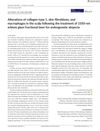 29 citations,
April 2019 in “Lasers in Medical Science”
29 citations,
April 2019 in “Lasers in Medical Science” Laser and minoxidil combo promotes better hair growth than minoxidil alone, safely.
 July 2024 in “Journal of Cosmetic Dermatology”
July 2024 in “Journal of Cosmetic Dermatology” Fractional laser therapy is a promising, effective, and minimally invasive treatment for hair loss.
 April 2024 in “Lasers in medical science”
April 2024 in “Lasers in medical science” Lasers and light therapies are effective in promoting hair regrowth for different types of hair loss.
 14 citations,
October 2020 in “Natural Products and Bioprospecting”
14 citations,
October 2020 in “Natural Products and Bioprospecting” Various treatments, including FDA-approved drugs, natural products, and oral supplements, can help with hair loss, but a patient's medical history and potential allergies should be considered when choosing a treatment.
 3 citations,
March 2019 in “Chinese Medical Journal”
3 citations,
March 2019 in “Chinese Medical Journal” CO2 fractional laser therapy may help regrow hair without scarring by affecting certain inflammatory and growth-related molecules.
4 citations,
December 2021 in “Applied sciences” Micro-needling with low-level light therapy effectively increases hair growth in people with mild to moderate hair loss.
 June 2021 in “Journal of Cosmetic Dermatology”
June 2021 in “Journal of Cosmetic Dermatology” Laser treatment shows promise for hair growth, but needs further research.
 1 citations,
October 2023 in “Dermatology and therapy”
1 citations,
October 2023 in “Dermatology and therapy” Some treatments for severe hair loss work but often have side effects, with baricitinib showing the most promise.
 July 2023 in “JAAD International”
July 2023 in “JAAD International” Two drugs, finasteride and minoxidil, are approved for hair loss treatment, but new therapies are being developed.
 57 citations,
October 2013 in “international journal of endocrinology and metabolism”
57 citations,
October 2013 in “international journal of endocrinology and metabolism” Female pattern hair loss is common, linked to polycystic ovarian syndrome, and treated with topical Minoxidil.
 165 citations,
August 2013 in “Lasers in Surgery and Medicine”
165 citations,
August 2013 in “Lasers in Surgery and Medicine” Low-Level Laser Therapy is effective and safe for hair growth with minimal side effects.
 October 2023 in “The Cochrane library”
October 2023 in “The Cochrane library” The medicine baricitinib was found to notably improve hair regrowth in alopecia areata, but more research is needed on its side effects and other treatments.
 36 citations,
June 2018 in “Journal of Dermatology”
36 citations,
June 2018 in “Journal of Dermatology” Use finasteride, dutasteride, and minoxidil for hair loss treatment.
 January 2019 in “Springer eBooks”
January 2019 in “Springer eBooks” PRP and LLLT can improve hair growth in AGA, but more research needed.
 1 citations,
July 2023 in “Cureus”
1 citations,
July 2023 in “Cureus” Some treatments for hereditary hair loss are effective but vary in results and side effects; new therapies show promise but need more research.
 24 citations,
February 1987 in “Drugs”
24 citations,
February 1987 in “Drugs” Minoxidil promotes hair regrowth, but more research needed for effectiveness and response factors.
 January 2012 in “Postgraduate obstetrics & gynecology”
January 2012 in “Postgraduate obstetrics & gynecology” Up to half of women by age 50 experience significant hair loss, with various types and treatments available.
 December 2023 in “Lasers in Medical Science”
December 2023 in “Lasers in Medical Science” Fractionated laser therapy, especially erbium-glass laser, effectively increases hair thickness in people with hair loss but doesn't increase the number of hairs.
 33 citations,
March 2017 in “Dermatologic Surgery”
33 citations,
March 2017 in “Dermatologic Surgery” Low-level laser therapy effectively treats female hair loss, increasing hair count by 51%.
 September 2022 in “Polish Hyperbaric Research”
September 2022 in “Polish Hyperbaric Research” Some treatments for hair loss, like finasteride, biotin, and minoxidil, can be effective, but their success varies by individual case.
 25 citations,
August 2017 in “Lasers in Medical Science”
25 citations,
August 2017 in “Lasers in Medical Science” Fractional lasers seem effective and safe for treating hair loss, but more research is needed to find the best treatment methods.
 April 2016 in “Journal of The American Academy of Dermatology”
April 2016 in “Journal of The American Academy of Dermatology” People with hair loss have low zinc levels; zinc supplements and laser therapy may help.
 1 citations,
August 2022 in “JAAD case reports”
1 citations,
August 2022 in “JAAD case reports” Pioglitazone use was linked to hair regrowth in a patient with permanent hair loss from cicatricial alopecia.
 19 citations,
September 2011 in “Seminars in Cutaneous Medicine and Surgery”
19 citations,
September 2011 in “Seminars in Cutaneous Medicine and Surgery” At-home laser and light skin devices are less effective than professional ones, with limited scientific evaluation, but some show promise for wrinkles, hair growth, and acne.
 81 citations,
August 2014 in “Lasers in Surgery and Medicine”
81 citations,
August 2014 in “Lasers in Surgery and Medicine” Red light therapy is safe and effectively increases hair growth in women with hair loss.
 October 2024 in “Aesthetic Plastic Surgery”
October 2024 in “Aesthetic Plastic Surgery” Micrografts are a safe and effective treatment for hair loss in both men and women.
 December 2023 in “EPRA international journal of multidisciplinary research”
December 2023 in “EPRA international journal of multidisciplinary research” Alopecia areata causes sudden hair loss, has genetic links, and can be managed but not cured.
 15 citations,
January 2019 in “International Journal of Women's Dermatology”
15 citations,
January 2019 in “International Journal of Women's Dermatology” Early treatment helps stop hair loss in women of color.
 November 2024 in “Health Science Reports”
November 2024 in “Health Science Reports” Light/laser therapy can effectively increase hair density in some types of alopecia, especially androgenic alopecia and alopecia areata.
 3 citations,
May 2018 in “The Journal of the American Animal Hospital Association/Journal of the American Animal Hospital Association”
3 citations,
May 2018 in “The Journal of the American Animal Hospital Association/Journal of the American Animal Hospital Association” Deslorelin implants successfully treated hair loss in two male Keeshonden dogs.




























